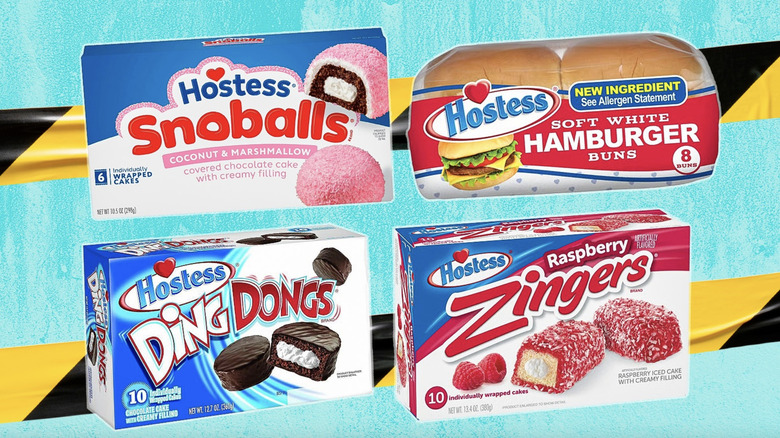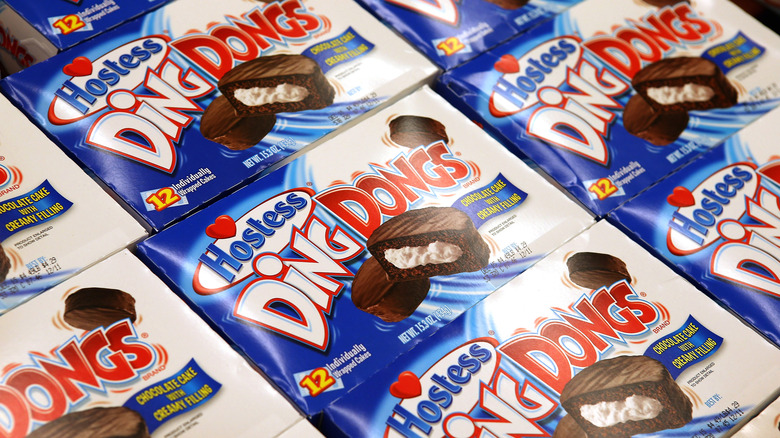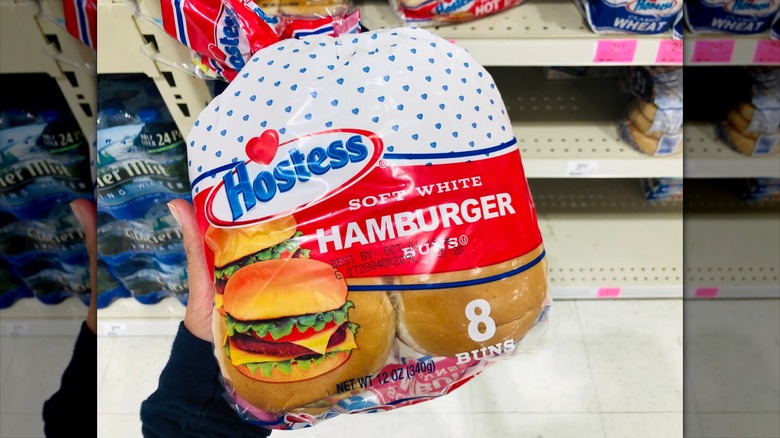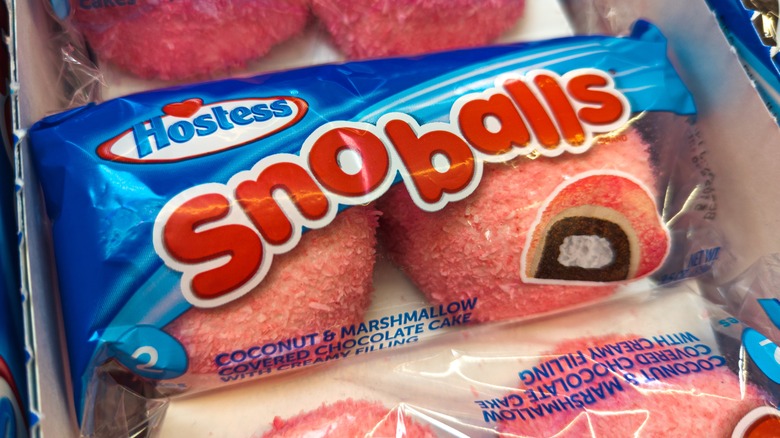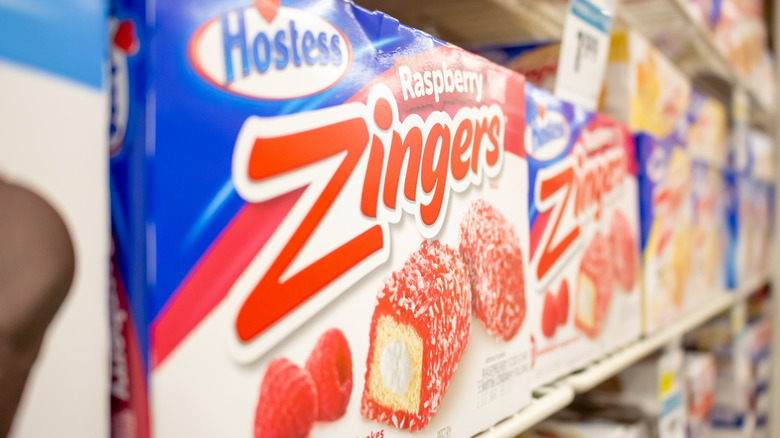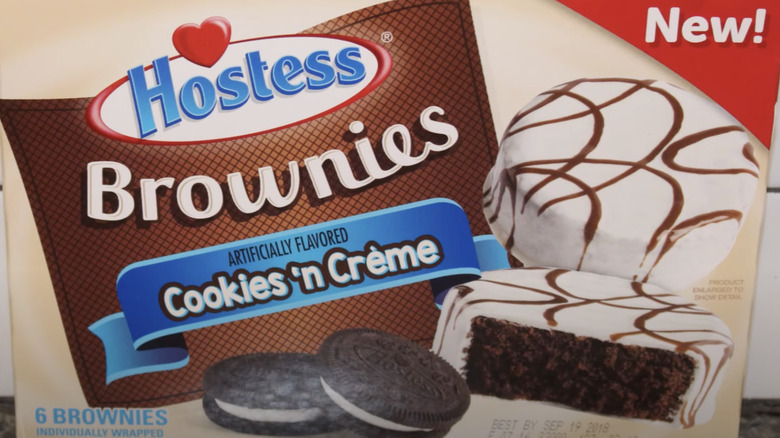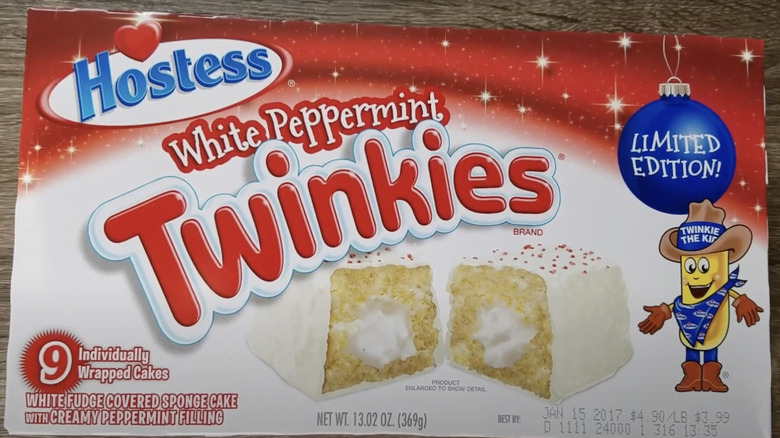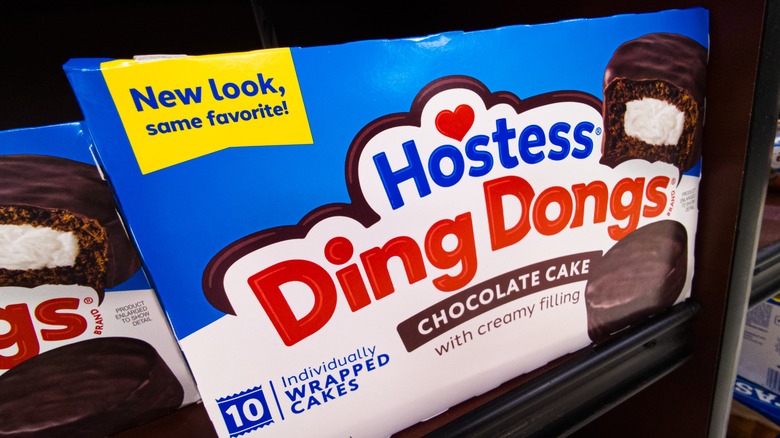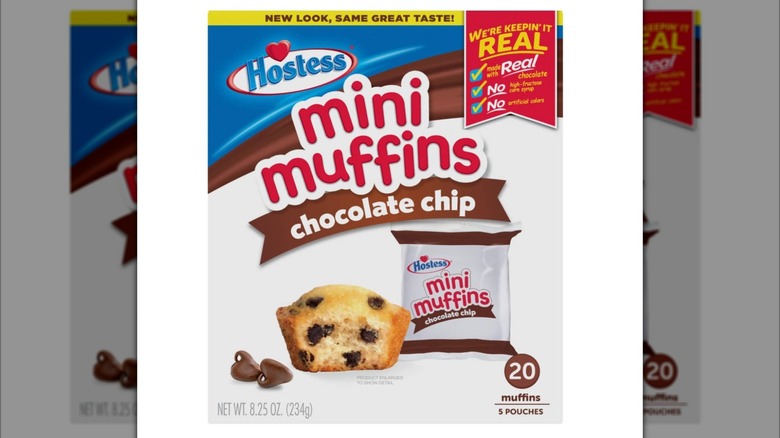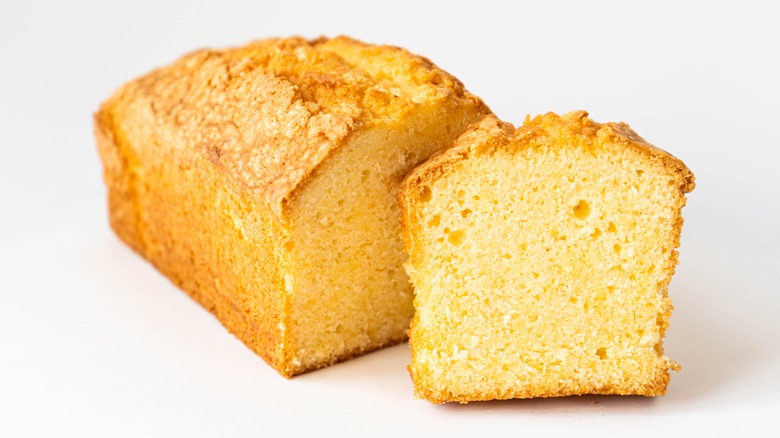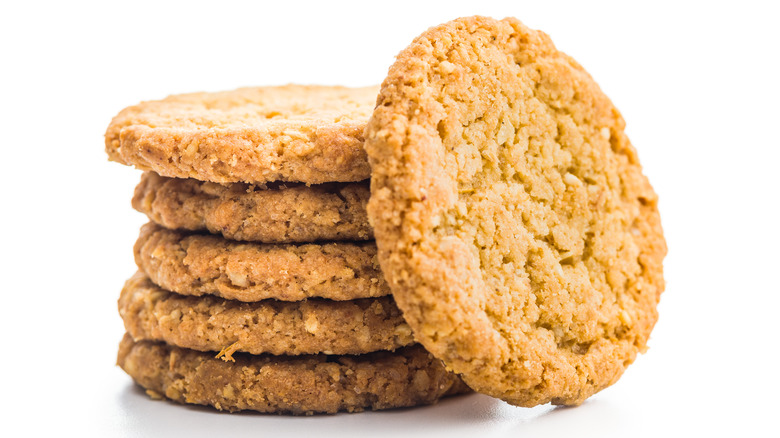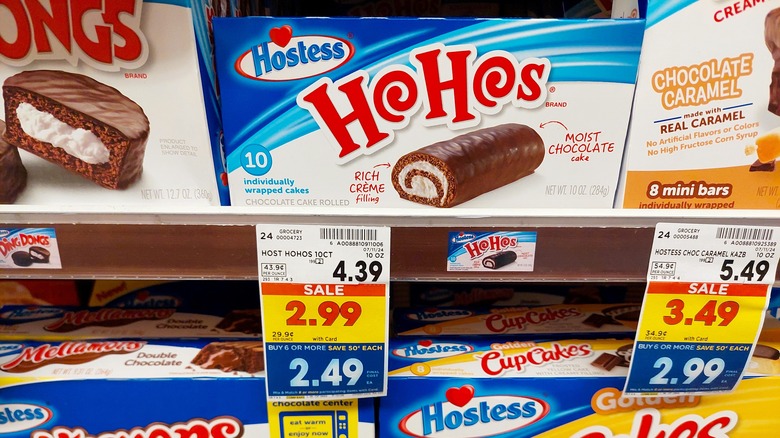11 Hostess Recalls That Affected Millions
We may receive a commission on purchases made from links.
Hostess started out under Continental Baking in 1919 with the debut of its first snack, the Hostess CupCake. The brand exploded in popularity in the 1930s with the advent of Twinkies, sponge cakes that initially featured a banana-flavored filling. Other sweet snacks, such as Donettes, Snoballs, and Ding Dongs, followed, positioning Hostess as one of America's favorite confectionery brands. But despite its longevity, Hostess' journey hasn't always been smooth.
The brand has weathered a string of bankruptcies and buyouts over the decades, with Hostess acquired by the Interstate Bakeries Corporation in 1985 for $560 million. Despite its household name status, Interstate Bakeries ended up filing for bankruptcy in 2004. The company reemerged in 2009 with a new name — Hostess Brands — before filing for bankruptcy again in 2012. A year later, Apollo Global Management and Metropoulos & Co. purchased Hostess, restoring the likes of Twinkies and Ding Dongs to supermarket shelves. In 2023, Hostess was acquired by The J.M. Smucker Co. in a $5.6 billion deal. To further complicate matters along this already eventful journey, Hostess has also been hit with multiple product recalls along the way.
Just like plenty of other companies producing sweet treats, the history of Hostess products is checkered with scares over everything from salmonella to undeclared allergens. It's even had to contend with more unexpected incidents, such as potential asbestos contamination. Ready to find out about the biggest recalls to ever hit Hostess? Here's our roundup of the most memorable recalls in the company's history.
Hostess Ding Dongs recalled due to potential mold contamination (2025)
Hostess Ding Dongs are round, cream-filled chocolate cakes coated in a layer of fudgy icing. Introduced in 1967, the sweet, hockey puck-shaped treats were named after a TV advertising campaign featuring a ringing bell. Decades later, in 2025, Hostess Brands found itself at the center of controversy when it issued a recall of Hostess Ding Dongs due to possible contamination with mold.
The J.M. Smucker Co., the parent company of Hostess, pulled the confections from supermarket shelves after discovering that a malfunctioning piece of equipment created conditions conducive to mold growth. While small amounts of mold are usually harmless, they can sometimes cause illness. Symptoms of mold ingestion can include diarrhea, nausea, and fever.
The problem was addressed shortly after being identified, limiting the scope of the recall to Ding Dongs with best-by dates between August 30 and September 3. The affected products included several sizes of Hostess Chocolate Ding Dongs packages, with customers encouraged to return affected products and distributors asked to destroy any within their inventories.
Hostess hamburger buns and hot dog buns recalled due to possible contamination with listeria and salmonella (2021)
Two years before its acquisition by J.M. Smucker Co., Hostess Brands recalled several batches of its Soft White Hamburger Buns and Soft White Hot Dog Buns. The recall was triggered by routine monitoring at co-manufacturer Best Harvest Bakeries, which revealed potential contamination with listeria and salmonella. In total, Hostess pulled 32 lots of hamburger buns and 16 lots of hot dog buns from grocery and convenience stores. It's unclear how the pathogens entered the production line.
While no adverse health consequences were linked to the baked goods at the time of the recall, listeria and salmonella bacteria can cause very serious infections. Both pathogens can cause foodborne illness, often leading to symptoms such as fever, diarrhea, nausea, and abdominal pain. Although listeria and salmonella may only cause short-term illness in healthy adults, both bacteria can be particularly dangerous for young children, the elderly, and consumers with compromised immune systems.
Hostess Snoballs recalled over undeclared allergen (2021)
Launched in 1947, Snoballs are one of Hostess' most recognizable offerings. These dome-shaped treats combine chocolate cakes with a creamy filling, all coated in marshmallow frosting and pink-hued coconut flakes. Hostess also sometimes makes seasonal variations of the cakes, such as green Hostess Lucky Puffs for St. Patrick's Day.
In 2021, Hostess Brands issued a recall of specific batches of its classic single-serve Snoballs because they contained an undeclared allergen. More specifically, the Hostess Snoballs, which contain coconut, were accidentally packaged in wrappers intended for Hostess Chocolate CupCakes, which don't list coconut as one of the ingredients. Until 2025, the FDA classed coconut as a tree nut, which is recognized as one of the FDA's nine major allergens, alongside milk, eggs, fish, shellfish, peanuts, wheat, soybeans, and sesame. Luckily, no illnesses were connected to the product at the time the recall took place.
Hostess Raspberry Zingers recalled because of potential contamination with mold (2020)
The first Hostess Zingers appeared in stores in the 1970s. The log-shaped cakes feature a rich, creamy filling and are coated in a brightly colored layer of icing. Today, the snack is available in devil's food cake, vanilla, and raspberry varieties. However, it's the raspberry variety of the sweet treat — featuring vanilla cake, creamy filling, and a raspberry-flavored coating — that prompted a recall in 2020.
Hostess Brands announced the recall of Raspberry Zingers after discovering the snack was at risk of becoming moldy before its best-by date. The company didn't disclose any further details about the cause of the problem. The recall affected various types of Raspberry Zingers, including fresh and frozen multi-packs and single-serves. The Raspberry Zingers were shipped to grocery stores, distributors, and discount stores across the U.S., but it's unclear exactly how many units of the sweet treat were affected by the recall overall.
Hostess Cookies 'n Crème Brownies recalled due to undeclared allergen (2018)
Cookies and cream is a timeless flavor pairing. By blending the crunchy texture of chocolate cookies with the sweetness of cream, the combination turns simple ingredients into a dessert classic. When turned into brownies, the cookies and cream duo transforms into fudge chocolate swirled with cookie crumbles and finished with a creamy topping. Hostess Cookies 'n Crème Brownies were no exception, showcasing the brand's knack for contrasting textures and flavors.
In 2018, Hostess Cookies 'n Crème Brownies became the focus of a recall after a packaging error. Although eggs were listed among the ingredients on the packaging, they were omitted from the "contains" statement meant to provide clear allergen warnings for sensitive individuals. No reports of allergic reactions were linked to the cookies and cream at the time of the recall, with the company pulling the product from the shelves as a precautionary measure. Sadly, it seems like Hostess Cookies 'n Crème Brownies have since been discontinued.
Hostess White Peppermint Twinkies recalled over possible salmonella contamination (2017)
Twinkies are the quintessential American junk food, to the point that there is even a National Twinkie Day (it's on April 6, if you were wondering). Invented in 1930 to utilize the strawberry shortcake equipment that stood idle when the berries were out of season, it wasn't long before Twinkies captured the country's sweet tooth. Today, Hostess continues to manufacture the spongy cakes, with regular flavors including banana and chocolate. The company sometimes also offers limited edition versions of the snack.
In 2017, Hostess Brands sparked concern among snack fans when it recalled its White Peppermint Twinkies due to possible salmonella contamination. Hostess raised the alarm after its supplier, Blommer Chocolate Company, disclosed that the coating contained milk powder recalled by Valley Milk Products over possible salmonella contamination. Hostess issued a voluntary recall of the product, even though none of the samples examined by the company tested positive for the pathogen, opting to err on the side of caution. The product had been distributed nationwide, and customers were asked to return their boxes ASAP.
Snack cakes and donuts recalled because of undeclared allergen (2016)
Since most companies don't usually produce all the raw materials themselves, they often rely heavily on ingredient suppliers. This dependency on external sources means that one supplier's contamination or labeling issue can trigger recalls across multiple food companies. This is precisely what happened in 2016 when Hostess Brands recalled several of its snack cakes and donuts due to undeclared peanuts.
Hostess Brands issued the voluntary recall of its cakes and donuts after being alerted by one of its suppliers, Grain Craft, that its flour tested positive for peanut residue. In total, Hostess pulled more than 700,000 cases of snacks from grocery store shelves. The tainted products included a range of Ding Dongs, Zingers, and Chocodiles. A wide range of donuts was also affected, including chocolate, glazed, maple, and powdered varieties. At least two children suffered allergic reactions after eating the baked goods.
Hostess Chocolate Chip Mini Muffins recalled due to undeclared allergen (2010)
Hostess offers a lineup of breakfast muffins in appealing flavors such as blueberry, banana, and chocolate. At one point, the company also sold Hostess Chocolate Chip Mini Muffins — bite-sized, golden-baked snacks peppered with dark chocolate chips. Compact, portable, and delicious, the muffins may not have been the most nutritious choice, but they delivered a convenient pick-me-up any time of day.
In 2010, Hostess Brands issued a voluntary recall of these muffins due to a labeling error. More specifically, the company filled its multipack boxes of Chocolate Chip Mini Muffins with Banana Nut Mini Muffins. Unlike the chocolate chip muffins, their banana nut counterparts contained walnuts, which fall under the FDA's definition of a major allergen. No allergic reactions had been reported at the time of the recall, but nut allergies can be very serious, sometimes even leading to fatal anaphylaxis.
Hostess Mini Pound Cakes recalled due to undeclared tree nuts (2007)
Pound cake gets its name from its original recipe — 1 pound each of flour, butter, sugar, and eggs. While the name stuck, the pound cake recipe has been tweaked over the years to produce lighter textures and smaller portions. Most variations of the sweet treat today use leaveners such as baking powder to keep the cake from being too dense. Some modern pound cake recipes even incorporate unexpected ingredients such as cheddar cheese.
Back in 2007, cheddar wasn't the surprise ingredient that triggered a mass recall. Hostess Brands pulled its Mini Pound Cakes from supermarket shelves after a mislabeling fiasco. The issue came to light in the worst possible way — after a consumer reported suffering an allergic reaction triggered by eating the sweet treat. Further investigation revealed that some Mini Pound Cakes actually contained Hostess Carrot Cake, which contained walnuts. This posed a serious risk to consumers sensitive to the allergen.
Hostess oatmeal cookies recalled due to undeclared allergens (2005)
While Hostess is better known for its cakes than for its cookies, the brand has actually experimented with several cookie lines over the years, including short-lived products like oatmeal cookies. In 2005, Interstate Bakeries, as the company was then known, faced public scrutiny when it recalled certain batches of Hostess oatmeal cookies due to a labeling blunder.
The error was caused by a manufacturing mix-up that resulted in chocolate chip cookies ending up in oatmeal cookie packaging. This was a problem because the chocolate chip cookies contained two well-known allergens — milk and eggs — which weren't present in the oatmeal cookies. While there were no reports of allergic reactions at the time of the recall, the blunder could have ended very badly if consumers who were sensitive to milk or eggs trusted that the product labeling was accurate.
Hostess snacks recalled over asbestos contamination (1998)
One of Hostess' earliest recalls was also its biggest, forcing the company to pull millions of products from the shelves and sparking panic among customers. The manufacturer of Hostess snacks at the time, Interstate Bakeries, recalled a range of sweet treats after asbestos was found at the company's plant in Schiller Park, Illinois, and ordered it closed.
The problem occurred when asbestos from insulation removal was accidentally spread throughout the facility. Breathing in asbestos has been linked to cancer, with some studies also suggesting that swallowing the fibers can pose similar risks. In total, Interstate Bakeries removed more than 12 different products from stores in 21 states.
Although the company claimed that the products were safe, a lawsuit alleged confirmed instances of asbestos in two tested samples of Ho Hos. In 1998, Kenneth B. Moll & Associates filed a lawsuit against Interstate Bakeries, claiming that the company may have exposed employees and customers to asbestos for more than 25 years.
